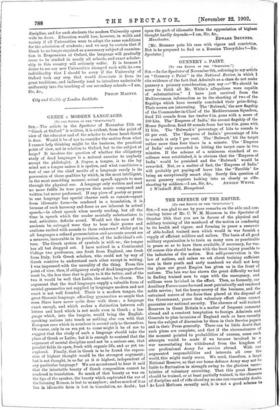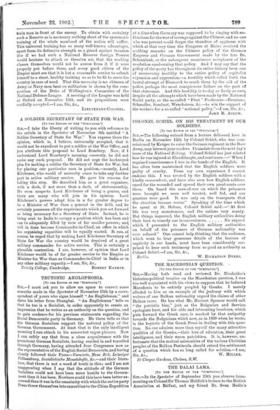THE DEFENCE OF THE EMPIRE.
[TO THE EDITOR OF THE "SPECTATOR."]
Srn,—I was glad to see by your remarks on the able and con- vincing letter of Mr. C. W. M. Moorsom in the Spectator of October 18th that you are in favour of the physical and military training of the manhood of the nation as conducing to its health and vigour, and forming in peace a reservoir of able-bodied trained men which would in war furnish a supply of efficient soldiers and sailors. The basis of all good military organisation is to train as many men as practicable in peace so as to have them available, if necessary, for war. Of course this should be done with the least injury possible to the industries of the nation. But self-preservation is the law of nations, and unless we set about training sufficient men in their youth and early manhood we shall not keep the place our great Empire has given us in the front of nations. The late war has shown the great difficulty we had in finding trained men to cope with the emergency, and millions were lavished in the effort. Then, as formerly, our Auxiliary Forces came forward most patriotically and rendered noble service ; but the hurry-scurry of the business, and the untrained nature of the force then placed at the disposal of the Government, prove that voluntary effort alone cannot guarantee our national security. The absence of well-trained Reserves in Great Britain is a matter of frequent comment abroad and a constant temptation to foreign Admirals and Generals to plan invasions of England such as have recently been the subject of discussion by them in their Service papers and in their Press generally. There can be little doubt that such plans are complete, and that if the circumstances of the moment pointed to probabilities of success, some such attempts would be made if we became involved in a war necessitating the withdrawal from the kingdom of our professional Army for service abroad. With our augmented responsibilities and interests all over the world, this might easily occur. We need, therefore, a large National Reserve, so that our home defence Army may not be liable to fluctuation in strength owing to the glorious uncer- tainties of voluntary recruiting. That this great Reserve should be trained, or at least partially trained, in the elements of discipline and of rifle shooting no one can reasonably doubt. As Lord Methuen recently said, it is not a good scheme to
train 'mien in front of the enemy. To obtain with certainty such a Reserve as is necessary nothing short of the systematic training of the whole manhood of the nation will suffice. This universal training has so many well-known advantages, apart from its defensive strength as a guard against invasion (for if we bad such a National Reserve foreign Powers would hesitate to attack or threaten us), that the working classes themselves would not be averse from it if it were properly put before them, and every good citizen of the Empire must see that it is but a reasonable service to submit himself to a short, healthy training so as to be fit to serve his country in case of need. That this necessity is no chimera of Army or Navy men bent on militarism is shown by the com- position of the Duke of Wellington's Committee of the National Defence League. A meeting of the League was held at Oxford on November 12th, and its propositions were cordially accepted.—I am, Sir, &c.,
LIEUTENANT-COLONEL.











































 Previous page
Previous page